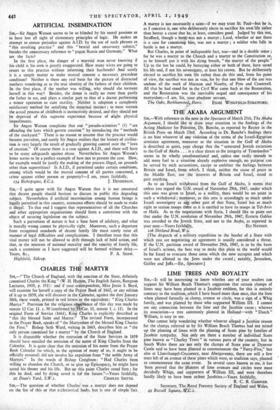SIR,—The question of whether Charles was a martyr does not
depend on the fiat of this or that ezclesiastical body, but is one of 'simple fact. A martyr is not necessarily a saint—if we may trust St: Paul—but he is, as I conceive it, one who deliberately elects to sacrifice his ownlife rather than betray a cause that he, at least, considers good. Judged by this test, Strafford, though a herti;t was not a martyr ; Laud, whether or not there is a case for canonising him, was not a martyr ; a soldier who falls in battle is not a martyr.
But Charles, in point of indisputable fact, was—and in a double sense ; for he was a martyr to the Church and a martyr to the Constitution or, as he himself put it with his dying breath, " the martyr of the people." Up to the last he could; by betraying either or both of these, have saved his life -and, if not his sovereignty, at least his crown. But he deliberately elected to sacrfficehis own life rather than .do this .and, from his point of View, the sacrifice was not in vain, for by that one blow of the axe was undone all the work of Marston and Naseby, of Pym and Cromwell. All that he had stood for in the Civil War came back at the Restoration, and the RestoratiOn was the inevitable sequel and consequence of his martyrdom.—I am, Sir, your obedient servant,






































 Previous page
Previous page